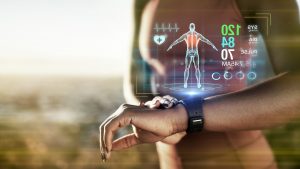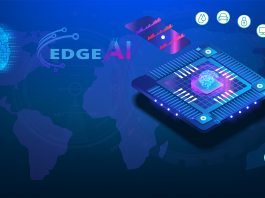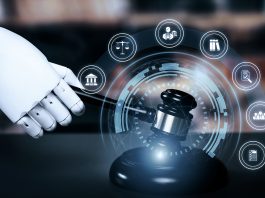With the growing pressure on healthcare providers showing no sign of slowing, The Innovation Platform explores ways in which AI in healthcare can help increase performance.
One of the technology industry’s fastest-growing avenues is that of Artificial Intelligence (AI). From voice synthesis bringing fictional and real people to life to text prediction that is getting so good you could be tricked into thinking you were talking to a real person, the potential for AI is growing at an unprecedented pace. One industry that is adopting AI in healthcare. While it can be a lengthy process to adapt the systems, the potential benefits of AI in healthcare cannot be ignored.
Humans and machines working together
AI is showing great promise to enhance the world of healthcare. Though many people are under the impression that AI may replace doctors, it is generally agreed upon by experts that, at best, AI alone could only be as good as an average doctor. It’s more likely that AI would perform worse. Where AI would really shine would be working in conjunction with doctors and being utilised to speed up and increase the accuracy of their performance.
An example of this is in diagnosing and treating diseases. AI has the potential to analyse a database much larger than a human doctor could ever hope to go through, and AI can scan through said database at lightning speed compared to the research skills of a human. Therefore, it only makes sense that an AI assistant for doctors, especially concerning minor injuries and illnesses, would be a great boon and rapidly speed up the process of the patient seeing the doctor and receiving a diagnosis.
In a similar vein, AI can help with treatment. It can have access to a database of every available drug, physiotherapy, operation type, and rates of success for each based on different parameters. They can be told how severe the patient’s condition is, and AI could very quickly draw up a treatment plan for that patient. Of course, it would be best for the doctor to still approve of the plan as the AI lacks social cues or the ability to be aware of any personal or special conditions. This is an excellent example of why AI in healthcare cannot replace doctors but can be of great help to them as it would be much quicker for a doctor to double-check an AI-generated plan of treatment rather than to draw one up from scratch themselves.
From the body to the brain
Another facet of how AI could revolutionise the healthcare industry is in finding new drugs to use in patient treatments. AI has been shown to be a great asset in the identification and targeting of molecules that cause disease, finding a binding protein, and identifying biomarkers of diseases in human blood. This is vital information for the identification and diagnosis of diseases, but also in the development of drugs targeting those diseases. Furthermore, it has shown great potential in predicting factors such as toxicity, bioactivity, and physiochemical reactions in the human use of these drugs. While this all increases the speed of creating a new drug for a disease, it also greatly reduces the cost and manpower needed.

The process of developing new drugs can be sped up greatly with AI assistance
While we have discussed the physical implications of AI in healthcare, it is also extending its reach to mental health care. Mental health is unique in that doctors cannot extract information from the patient without the need for their help. Instead, diagnosing mental health conditions requires the patient to report everything they are thinking, feeling, and experiencing for doctors to gain an understanding and diagnose the patient. This is called evidence-based medicine (EBM). One of the drawbacks of EBM is that it can be notoriously inaccurate due to either the patient not clearly expressing their experience (or not being able to), or the doctor either being too quick in their diagnosis, or conversely taking too long and essentially overthinking a diagnosis.
When this happens, the treatment of a patient essentially devolves into experimentation until the correct treatment is found. AI may be able to step in here and use its precise algorithms in order to strengthen the process of diagnosing a patient by recognising certain patterns in patient behaviour. For example, subtle patterns in their speech may be indicative of a depressive disorder or anxiety. Using a similar database, as discussed above, it may also be able to narrow down the number of conditions that a patient may have and, in rare cases, spot symptoms that a doctor might not be able to due to how subtle it is or simply from human fallacy. Furthermore, AI can potentially also be used to recommend the best course of treatment for a patient, again at the doctor’s discretion, to enhance the speed of patient diagnosis and treatment. Another use for AI in mental health care is in wearable technology, i.e. smartwatches. With these technologies, doctors can be aware of patients’ sleep patterns, heart rates, activity levels, etc. and be able to add this information to their diagnosis and treatment.
Other benefits of AI in healthcare
These are only some of the potential uses for AI in healthcare, and the potential benefits of adopting AI into healthcare systems do not end with just helping single patients. Using the NHS as an example, the pressure on healthcare workers is at an all-time high. In terms of workforce, it is estimated that, by the year 2030/31, the NHS will require another 314,000 healthcare professionals.1 The gap between the supply of workers and the demand for workers is estimated to be around 250,000. Globally speaking, we are on track to be short of 5,000,000 doctors by 2030.2 Naturally, this shortage of healthcare workers means that the healthcare workers we do have are facing much more pressure.
What AI in healthcare can do for us
Obviously, AI alone cannot solve the staffing issue but it can relieve at least some of the pressure by alleviating some of the work that goes into a patient, which in turn will shorten the time it takes to see, diagnose and treat each patient and, as we have discussed, will reduce the cost of seeing and treating each patient. To put it frankly, the mass adoption of AI into healthcare has the potential to significantly decrease the workload for doctors and other healthcare professionals, which will undoubtedly make their jobs much more appealing. Therefore, AI can potentially indirectly cause an increase in the number of staff working towards becoming doctors or nurses.

The rise in use of wearable technology offers advantages for patient monitoring
While the testing and application of AI in healthcare is still in its infancy, the initial tests appear to be most promising indeed. The drive to develop healthcare-based AI is great, with the UK government having spent £250m on the NHS AI Lab in 2020, and in the US, the Food and Drug Administration introduced the Artificial Intelligence/Machine Learning Based Software as a Medical Device Action Plan, in order to regulate the rapidly growing technology and ensure its benefits are utilised properly.
References
2. Artificial intelligence in healthcare: transforming the practice of medicine – PMC (nih.gov)
Please note, this article will also appear in the fifteenth edition of our quarterly publication.









